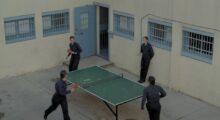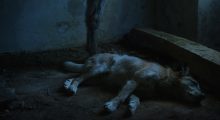Angela Schanelec
-
Sequential Notes: Angela Schanelec on Music

Since her debut feature, My Sister’s Good Fortune (1995), Angela Schanelec has steadily established herself as one of the Europe’s most idiosyncratic filmmakers. Across nine features, Schanelec’s style has evolved but retained consistent qualities: stark, clean visuals and crisp editing combined with elusive narrative techniques that crescendo into unexpected moments of emotional catharsis. A subject of hardcore cinephile fandom since her 2019 feature I Was at Home, But…, Schanelec seems to be gaining broader acceptance. Still, the peculiarities of her approach can be off-putting for general audiences. I first encountered Schanelec’s work at the Locarno Film Festival, where I was […]
by Graham Swon on Jun 27, 2024 -
“It Doesn’t Make Sense to Explain Anything”: Angela Schanelec on I Was at Home, But… and Robert Bresson

The first time I saw Angela Schanelec speak, there was nothing for her to smile about: at a cartoonishly hostile Q&A for 2016’s The Dreamed Path, she fielded questions like “Was this supposed to take place in an alternate universe where emotions don’t exist?” and admirably didn’t yield an inch. Returning to TIFF, Schanelec was onhand not just for Q&As for her latest, I Was at Home, But… but to introduce a 35mm rep screening of Robert Bresson’s Pickpocket—one of the foundational works from a director whose influence on, and importance for, Schanelec’s work is immediately apparent. Both when I interviewed her […]
by Vadim Rizov on Oct 2, 2019 -
TIFF 2019, Day 2: I Was at Home, But…, Zombi Child, First Love

As Giovanni Marchini Camia notes in this valuable, context-providing review/interview of I Was at Home, But…, Angela Schanelec’s fourth feature, 2001’s Passing Summer, was the first to give rise (in a Die Zeit review) to the term “Berlin School,” an imprecise but generally accepted designation for contemporaries including Christian Petzold, Maren Ade, Ulrich Köhler, Christoph Hochhäusler, Thomas Arslan et al. As Camia also notes, Schanelec’s relationship to this term is tense; her work is the most overtly severe, and it’s taken her longer to break through than her highest-profile peers. Internationally, Schanelec didn’t receive significant recognition until her ninth feature, 2016’s The Dreamed Path, until […]
by Vadim Rizov on Sep 6, 2019 -
Robert Bresson x 2 via NYRB Classics

NYRB Classics is not only reissuing Robert Bresson’s Notes on the Cinematograph but publishing Bresson on Bresson, a freshly translated interview collection. While the imprint’s never published a straight-up film book before, the former isn’t that eyebrow-raising: Bresson’s slender volume of koan-like declarations has been a fetish object outside of Film World since initial publication. Bresson on Bresson, though, is a different proposition. Interview collections (like the Conversations with Filmmakers series published by the University of Mississippi) are both valuable and inherently redundant, as subjects inevitably are forced to give the same answers over and over through the years. The interviews aren’t trimmed down […]
by Vadim Rizov on Nov 4, 2016 -
TIFF Critic’s Notebook 7: The Dreamed Path + Wavelengths

I had the truly rare advantage of a loose enough schedule to accommodate seeing all four of the Wavelengths shorts programs at TIFF this year, and they were kind of a lifesaver. For someone who’s made my trade watching and writing about movies, I’m a (paradoxically?) terrible marathon viewer. Following full-length, narratively driven films, one after another, is hard work, speaking purely personally; an hour’s-ish worth of avant-garde-leaning shorts does wonders to clear the mind. It’s a different kind of stimulation, and if you don’t like one another will be along any moment. I’m going to punt on the vast majority […]
by Vadim Rizov on Sep 22, 2016 -
Locarno Critic’s Notebook #2: The Dreamed Path, The Sun, The Sun Blinded Me and The Human Surge

Angela Schanelec’s continued lack of recognition, at least outside of Germany, is genuinely baffling. Judging from the dismissive-to-hostile reactions that followed the premiere of her eighth feature at the Locarno Film Festival, this regrettable state of affairs is unlikely to change. And yet, out of the competition entries I managed to see, The Dreamed Path is the only one I feel deserves to be called a masterpiece. The Dreamed Path is a demanding film, even more so than Schanelec’s previous work, but the challenge is legitimated by being commensurate with her thematic ambition: to dissect the torturous dialectic between the universal […]
by Giovanni Marchini Camia on Aug 12, 2016
